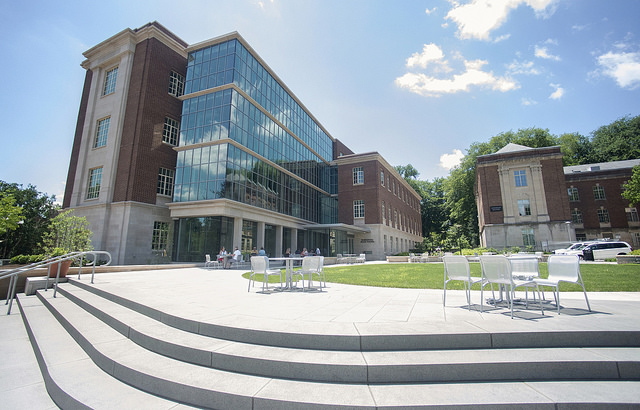Notes from the director
At the Penn State Center for Healthy Aging, we recognize that science does not exist in isolation. Every discovery we make, every training opportunity we provide, and every collaboration we foster happens in the context of a rapidly changing social and scientific landscape. As we move forward, I want to take a moment to reaffirm the values that guide us and the mission that defines us.
 Biobehavioral Health Building
Biobehavioral Health Building
Our Mission
To promote lifelong health and well-being through scholarship that fosters curiosity, partnership, and inclusion.
Why do we need our Center for Healthy Aging?
We are rapidly approaching a cultural tipping point. By 2035, for the first time in history, the number of people aged 65 and over will exceed the number of children and young people aged 18 and under. And by 2050, the number of centenarians in the U.S.--people 100 years of age or older--will increase by over 500% to 378,000. This increase in longevity is dramatically reshaping our society in ways that will impact our economic structure, our approach to healthcare, and how we manage long-term care and disability needs. But we’re also not prepared culturally.
Researchers, students, and community partners in the Center for Healthy Aging are working to realize our vision of a society that cultivates independence, security, and purpose for every person throughout their entire life.
History
Formally established in 1973, the Penn State Gerontology Center has enjoyed a long history as the home of seminal research and scholarship in the area of adult development and aging. In 2010, the center was renamed to “The Center for Healthy Aging” (CHA) to better reflect our commitment to promoting lifelong physical, social, and mental health through open and inclusive research, education, and outreach practices.
1940The agriculture and home economics faculty conducted projects on well-being of elderly pension recipients, retirement planning, and nutritional needs of the elderly.
1950University President Milton S. Eisenhower appointed the faculty Committee for the Study of Adulthood.
1952Penn State offered its first course in Gerontology.
1973President John W. Oswald formally established the Gerontology Center as a part of the College of Human Development.
1970sJoseph H. Britton directed the Gerontology Center for its first ten years, consolidating graduate and undergraduate training programs throughout the University with funding from the College of Human Development, the Administration on Aging, and the National Institute on Aging. Consistent with the priorities of a major land-grant university, extensive programs in continuing education and in the cooperative extension service for practitioners and community service groups were developed during his leadership.
1980sAfter Dr. Britton’s retirement, Dr. Gerald McClearn served as interim director of the Gerontology Center, managing the critical transition to a research focus. The quantity and diversity of research in aging increased dramatically with this change.
1985K. Warner Schaie is appointed director of the Gerontology Center. Under his leadership, the Center built a strong research portfolio in developmental psychology, cognitive aging, and longitudinal data collections such as the Seattle Longitudinal Study.
2003Melissa A. Hardy is appointed director of the Center. Under her direction, the mission of the Gerontology Center was extended to the development of partnerships for interdisciplinary and cross-college research. New projects integrated biology and genetics with social and behavioral science research and emphasized the study of aging throughout the lifespan, but particularly from mid-life through old age.
2009Martin J. Sliwinski is appointed director of the Center. Research in the Gerontology Center addressed longitudinal approaches to measurement and analysis, the study of change, the connection of stress to health in diverse contexts, and the role of social policy in framing the experience of aging.
2010The center is renamed “The Center for Healthy Aging.”
Contact Us
Emily Repka
Senior Human Research Technologist
emf5055@psu.edu
Erica Roque
Human Research Technologist
ear5875@psu.edu
Center for Healthy Aging
- Address: 422 Biobehavioral Health Building, 296 Henderson Drive, University Park, PA 16802
- Phone: 814-865-1710
- Fax: 814-863-9423
- Email: healthyaging@psu.edu
Keep up on our most recent News and Events, please
subscribe to our newsletter.
follow and connect us on LinkedIn.
Support the Center
You can support the Center for Healthy Aging’s vital mission of enhancing extending productive life throughout adulthood and into older age. Gifts to the Center help to fund innovative research projects, provide support to promising scholars, increase community outreach, and support collaborative efforts among faculty.
To partner with the Center
please contact:
- J. Nathan Reeves, Director of Development & Alumni Relations
- Phone: 814-863-4157
- Email: Nathan.Reeves@psu.edu
You may wish to write a check
If so, please make the check payable to Penn State with a notation in the memo section “Center for Healthy Aging” and then mail to:
Office of Development
College of Health & Human Development
201 Henderson Building
University Park, PA 16802
 Biobehavioral Health Building
Biobehavioral Health Building